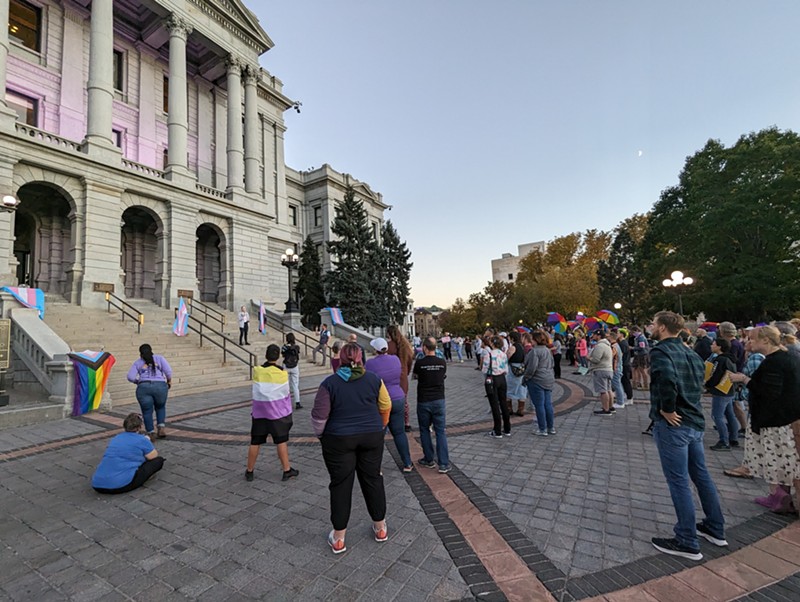In July, Children’s Hospital Colorado announced it would no longer provide gender-affirming surgical services for its transgender young adult patients, citing the need to shift policy “due to an unprecedented volume of referrals” and to operate “out of an abundance of caution.” Pediatric care can regularly continue for patients into early adulthood, depending on the specialization and need of the patient. Children’s Hospital’s decision abruptly stopped gender-affirming surgical services for its patients eighteen years and older and did not provide adequate transition plans. This decision means that Colorado is a less safe home for our young people, and it could have rippling effects nationally.
Gender-affirming care programs around the country are being shut down due to political pressure, while leading medical associations stand firm on the importance of providing evidence-based gender-affirming care. Colorado recently became one of the safest states in the country to access gender-affirming health care — but without hospitals, who will follow best practices and provide the care? Our community still cannot access the health care we need.
The rest of the country is watching Colorado right now to see if we will take a stand to continue to protect our trans community. If we stay silent in this pivotal moment, we send the message that it is okay to take away health-care services for trans people. Our health care has been made political, and it is not. It is a basic human right. This is not the time for hospitals to cave to political, financial or other pressures. This is the time for hospitals to adhere to best medical practice — that which is driven by decades of research and sanctioned by leading health authorities, and to stand in solidarity with LGBTQ+ Coloradans.
Thirty-five percent of trans youth now live in states where their health care is banned, and Children’s Hospital Colorado is one of the only places where young people in this area of the country have access to gender-affirming services. With a waitlist far outnumbering any other program and wait times exceeding eighteen months at Children’s Hospital, gender-affirming care is already extremely difficult to access. Any other program would be expanded with this type of demand, but because of the politicization of transgender health care, it has been downsized. The unexpected elimination of gender-affirming services for young adults at Children’s Hospital has made it even more difficult for patients to receive the care they were promised. Delays in life-saving care for any person, and especially young adults, have lasting impacts on mental and physical health. As LGBTQ+ Americans flee their home states and seek refuge in Colorado, our health-care systems have to grow and adapt to the increasing need for gender-affirming care here, not shut down services in the face of unprecedented need. We must hold our hospitals accountable to providing evidence-based, medically necessary health care for our trans community.
The science is clear: Gender-affirming care saves lives. WPATH’s Standards of Care 8 detail best practices for providing gender-affirming care. These standards include providing comprehensive care, including surgery when necessary, to adolescents and young adults. I urge Children’s Hospital Colorado to commit to following WPATH’s best practices by reinstating gender-affirming surgical services for its young adult patients.
We must also address the inequities being further heightened by this decision:
Children’s Hospital Colorado continues to provide surgeries to those over eighteen in other programs.
Children’s Hospital Colorado continues to provide chest and breast surgeries to patients under eighteen who are cisgender.
Children’s Hospital Colorado continues to do surgery on intersex infants, children and young adults.
This is discrimination against the trans community, and Coloradans must say something.
The future of gender-affirming care must be one where services are accessible, affordable, and supported with love and compassion. LGBTQ+ youth and young adults must be able to receive health care that meets their needs throughout their lives in ways they trust, and without an ideological agenda. Commitment to provide life-saving, inclusive health care is critical, as the health and safety of transgender and gender-diverse people are threatened across the country. We must let our young people know Colorado stands with them, and we will protect their right to exist as their authentic selves. We are a sanctuary state for transgender folks, and states across the country are watching us to follow our lead. Colorado must remain a sanctuary — the lives of our young people depend on it.
Everyone benefits from a society where people are allowed the freedom to be their authentic selves. Whether you are cisgender or transgender, this isn’t about an “us and them” — this is about all of our futures. This is about our bodily autonomy, our right to gender expression, our right to be free of discrimination and violence, our right to love. All of our health is tied up together, all of our freedom depends on each other’s freedom. Trans rights are human rights, and that means trans rights are your rights, too.
Skylar Patron lives in Denver and is Health Equity manager at One Colorado.
Westword.com frequently publishes commentaries on matters of interest to the community. Have one you'd like to submit? Send it to [email protected], where you can also comment on this piece.
[
{
"name": "Air - MediumRectangle - Inline Content - Mobile Display Size",
"component": "12017618",
"insertPoint": "2",
"requiredCountToDisplay": "2",
"watchElement": ".fdn-content-body",
"astAdList": [
{
"adType": "rectangle",
"displayTargets": "mobile"
}
]
},{
"name": "Editor Picks",
"component": "17242653",
"insertPoint": "4",
"requiredCountToDisplay": "1",
"watchElement": ".fdn-content-body",
"astAdList": [
{
"adType": "rectangle",
"displayTargets": "desktop|tablet"
},{
"adType": "rectangle",
"displayTargets": "desktop|tablet|mobile"
}
]
},{
"name": "Inline Links",
"component": "18838239",
"insertPoint": "8th",
"startingPoint": 8,
"requiredCountToDisplay": "7",
"maxInsertions": 25
},{
"name": "Air - MediumRectangle - Combo - Inline Content",
"component": "17261320",
"insertPoint": "8th",
"startingPoint": 8,
"requiredCountToDisplay": "7",
"maxInsertions": 25,
"watchElement": ".fdn-content-body",
"astAdList": [
{
"adType": "rectangle",
"displayTargets": "desktop|tablet"
},{
"adType": "rectangle",
"displayTargets": "desktop|tablet|mobile"
}
]
},{
"name": "Inline Links",
"component": "18838239",
"insertPoint": "8th",
"startingPoint": 12,
"requiredCountToDisplay": "11",
"maxInsertions": 25
},{
"name": "Air - Leaderboard Tower - Combo - Inline Content",
"component": "17261321",
"insertPoint": "8th",
"startingPoint": 12,
"requiredCountToDisplay": "11",
"maxInsertions": 25,
"watchElement": ".fdn-content-body",
"astAdList": [
{
"adType": "leaderboardInlineContent",
"displayTargets": "desktop|tablet"
},{
"adType": "tower",
"displayTargets": "mobile"
}
]
}
]











